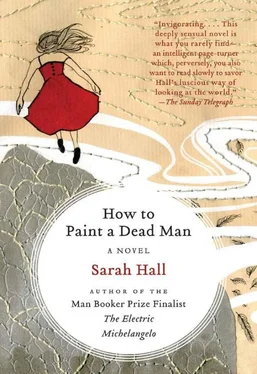Sarah Hall - How to Paint a Dead Man
Здесь есть возможность читать онлайн «Sarah Hall - How to Paint a Dead Man» весь текст электронной книги совершенно бесплатно (целиком полную версию без сокращений). В некоторых случаях можно слушать аудио, скачать через торрент в формате fb2 и присутствует краткое содержание. Год выпуска: 2009, Издательство: Harper Perennial, Жанр: Современная проза, на английском языке. Описание произведения, (предисловие) а так же отзывы посетителей доступны на портале библиотеки ЛибКат.
- Название:How to Paint a Dead Man
- Автор:
- Издательство:Harper Perennial
- Жанр:
- Год:2009
- ISBN:нет данных
- Рейтинг книги:4 / 5. Голосов: 1
-
Избранное:Добавить в избранное
- Отзывы:
-
Ваша оценка:
- 80
- 1
- 2
- 3
- 4
- 5
How to Paint a Dead Man: краткое содержание, описание и аннотация
Предлагаем к чтению аннотацию, описание, краткое содержание или предисловие (зависит от того, что написал сам автор книги «How to Paint a Dead Man»). Если вы не нашли необходимую информацию о книге — напишите в комментариях, мы постараемся отыскать её.
, Sarah Hall, "one of the most significant and exciting of Britain's young novelists" (
), delivers "a maddeningly enticing read... an amazing feat of literary engineering" (
).
How to Paint a Dead Man — читать онлайн бесплатно полную книгу (весь текст) целиком
Ниже представлен текст книги, разбитый по страницам. Система сохранения места последней прочитанной страницы, позволяет с удобством читать онлайн бесплатно книгу «How to Paint a Dead Man», без необходимости каждый раз заново искать на чём Вы остановились. Поставьте закладку, и сможете в любой момент перейти на страницу, на которой закончили чтение.
Интервал:
Закладка:
After she was taken, I understood how it felt to reject what is known to be true. I understood Dina’s desperation on those nights when she had heard our baby crying in the alleys. I understood sorrow, sorrow that is inestimable and unfinished. I should have walked with her when she scoured the streets looking for Elizabeta. I should have picked up a rifle.
In the last few years the money offered to Antonio for my self-portraits has tripled. They are rare, and they are felt to be the best clues to the enigma of identity. I have outlived tragedy; that is all. Much has been made of the descriptive accuracy in the paintings, the facial expressions, and how unlike the still-lifes they are. The last self-portrait was completed over twenty years ago, the year the war ended. It is not heroic.
As if to cheer me from my sad memories this afternoon, a postcard from Peter has arrived. He is in America, and has a wife! Here is such joyful symmetry. We should not look for signs, and yet how often they present themselves. Peter describes the Pacific as ‘terrifying’. It is so vast. The policemen ride horses as large as the Elgin marbles, he writes. He has spent five nights in a terrible hotel with torn sheets and bodies sprawled in the corridors. He has seen the Pan-American Unity mural. It is all a great adventure. It is ‘mind-opening’.
I am fortunate to receive correspondence from friends in all the countries of the globe. Though my life is one of reclusion, I have received many exotic gifts over the years. A tsuba from Japan, black pumice from the Antipodes. Antonio once sent me some antique woodcuts from Bavaria. In truth, I had hoped Peter might choose to come to Italy, to tour Florence and make notes on Fra Angelico, and perhaps even visit me in these humble hills. With what great enthusiasm we would have shaken hands! I would have enjoyed making him some coffee and showing him the objects in the studio. Here is also a lesson in today, in now, such as that found in the Odes of the Augustan poet. Last year, I was sent a gift of coffee from Louisiana. There are still a few black grains, enough spoonfuls left in the tin to filter. It is blended with chicory leaf; the taste is sour and interesting, and I have been saving it for no reason. We will have the last of it today when Antonio returns from the town.
The Fool on the Hill
The last few hours have been restless and uncomfortable, but the dawn is here. Early morning mist lies in austere banks along the valley floor and the boulders drift. Peter can see a weak, low sun through the white reefs at the head of the gorge. It must be almost seven. The hour of rise-and-shine, when civilisation restores itself. There is hope to be had. There’s the small road up above on which his distinctive old banger is parked and which will soon be carrying locals and a few late tourists. His car is a give-away, if anyone is looking for it. Some walkers might come this way, having strayed down from the Roman wall-the day looks as if it will set fine. He’ll hear their voices up above. He’ll hear the squeaking of the wire frets on the fence near the mouth of the ravine when they step down on the dividers, the pulse and rattle as they lift over, and he’ll know they are within earshot. No one has answered his shouting yet, but he does not feel so alone.
There’s a chilly relish to the air, and the aroma of the new season: damp notes of wood-rot, mushroom, mud. He can hear a bull blaring away in its pen nearby, objecting to its enclosure. The bugger could probably trample straight through the dry-stone walling if it chose, its beady eye staring off into the distant past as it heads for the cows in the pasture. But it keeps on calling, noo-oo, noo-oo, mired in its own behaviour, as if it’s the protest that matters. ‘Right on, fellow. Right on.’ Sometimes too, the bells of St Andrews can be heard, conducted by the mist, iron-clad, out of key. He is not so far away from everyone.
In the cottage his wife will be up. His side of the bed will not have been slept in. Nor will she find him passed out on the couch below, gin bottle gripped in his hand, drooling on the cushions. Out in the garth, his car is gone; only her Beetle will be there. She will register the void from the landing window as she goes to the bathroom. ‘Oh, Peter, what are you up to?’ she’ll whisper. The usual routines will apply. She will notice the new cold and so light a fire, and the crows will step down off the chimney as the smoke begins to ascend.
The kids will get up — Suze first. There will be a conversation over cups of tea and wholemeal toast. ‘Still not home?’ ‘No. Not like him to say nothing at all.’ ‘On a bender, you think?’ ‘Could be.’ Then they might rouse Danny. ‘Did Peter tell you where he was off to yesterday?’ And the three of them might troop out to the gate to see if he has driven home pissed from the pub and stalled somewhere in the lane. There’ll be no sign. Just an oily patch on the cobbles of the garth where the Daf is usually parked. They will consider ringing round. ‘Hello. The wanderer is on the loose again.’ But Donald won’t have seen him. The Jerry will say that last night he wasn’t in. And perhaps they will begin to worry then. Things will seem too quiet. Instinct will prickle. They will smell something out of sorts in the misty autumn air. They will see a buzzard with carrion in its beak, and the entrails will be readable.
What he wouldn’t give to be there in the fray, toasting some coffee beans in the range, boiling an egg and buttering a scone. He’d give his right arm. His left foot. Ha-ha.
It was a much livelier habitation before the kids grew up and (partly) left home. Something was always going on — chatter, band-practice, odd little art projects. Friends of Susan and Danny’s were always staying over, camping in the garden with their sleeping bags and bottles of cheap cider. ‘Mr C, have a glass of Bucky. Mr C, fancy a bit of hot knifing?’ It was fun. It made Peter feel young. At one stage the cottage was like an animal refuge centre. There was inevitably some furry or feathered creature parading around the gardens, a ruckus of squawks or grunts or whinnies. There were at one time or other goats and geese, rabbits and guinea pigs, a pig, a chinchilla, and even tame sparrows in eggbox nests, which had clocked their heads on the windows and stayed stunned long enough for the kids to bond with. Christ Almighty! The earnest dissection of worms on the chopping board!
Dan went through a spell of keeping weasels in a chicken-wire shelter. They used to dig their way out or gnaw through the barbs. He had a harness for walking them and he would sometimes try to sneak them into school in his gym bag, slipping them into his shirt between the buttons, like an old farmhand, so they bulged in a ring around his waist, scratching him with their claws and getting him sent to the nurse for flea bites. Once the school phoned up apologising for not noticing Danny’s ‘condition’ before, saying he could be excused from showering after cross country. The pet-shop rabbits always escaped, too, and had orgies with the local population, leaving a legacy of sorrel and red eyes in the burrows.
They all needed to be fed, successively, on a diet of vetch, potato peelings, slugs and snails. The goat had an industrial appetite; he remembers it eating car parts, wing mirrors, upholstery (not quite enough to fully dispose of the abandoned vehicles, which would have solved the scrapyard problem). Once it took the door trims of a Maxi. It was a bugger to wrestle away when it started chewing anything; it fought the rope and grunted in protest, glass tinkling crisply in its beard. The place was surrounded by sprout buckets and jars of pellets and compost bins. They were always on the hunt for dandelion leaves. It was great. It was a happy time.
Читать дальшеИнтервал:
Закладка:
Похожие книги на «How to Paint a Dead Man»
Представляем Вашему вниманию похожие книги на «How to Paint a Dead Man» списком для выбора. Мы отобрали схожую по названию и смыслу литературу в надежде предоставить читателям больше вариантов отыскать новые, интересные, ещё непрочитанные произведения.
Обсуждение, отзывы о книге «How to Paint a Dead Man» и просто собственные мнения читателей. Оставьте ваши комментарии, напишите, что Вы думаете о произведении, его смысле или главных героях. Укажите что конкретно понравилось, а что нет, и почему Вы так считаете.












